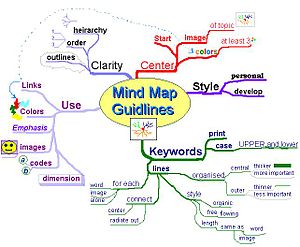skip to main |
skip to sidebar
Like many people I like looking around the internet and exploring new programs and links that other people send me. That is the way I found this program: Mindmeister.http://www.mindmeister.com/nl/content/product
Mindmeister is mostly a paid service but it allows you to create 3 mindmaps for free. If you have no idea what a mindmap is. Have a look at the example here or read up about it online. It is a technique that I use personally myself and it works very well with clients as well.
Especially creative people love putting their thoughts on paper this way.
What are the basics? As in the picture here, you start with one thought and you put that in the middle. From there you start adding categories that have to do with the thought in the middle. You try to put as much information down as possible and the trick is to do it with single words. No sentences! Images are allowed and even encouraged. Try it out and see how it works for you? For me it helps to clear my mind and put my projects into managable one page diagrams. With one look I have an overview of what I am doing and what I still have to do.
Does it also work online? Yes it actually works pretty well. If a client has made a mindmap she would like to discuss with me, she could send me a copy beforehand. [If you don't use an online program there is always the option of scanning it or taking a photo and upload that.] Or I could use a messenger program that allows for co-browsing. It makes an online session much more creative and once again shows that so many of the techniques we use f2f can be used online as well. One of the reasons I love this job so much.
Back in May I attended a workshop on how to deal with loss. When I just started my training I used to think that loss only meant dealing with the loss of a loved one. But my training showed me how important dealing with loss really is. And this workshop helped to remind me once more.
The workshop was in Dutch given by Riet Fiddelaers who specialises in dealing with loss and grief.If you read Dutch it is well worth it to have a look around her site. There is a section with usefull downloads in Dutch. The thing I came away with most is that loss and grieving are such broad terms and all of us have to deal with it at one time or another. I am not just talking about grieving a loved one. But also for example:
- The loss of health [through accident or illness]
- Loss of status [through losing a job]
- Loss of house [moving or dissasters]
- For children loss of family [through divorce]
And these are only a few examples. People deal with loss in different ways and most of us do not need help in dealing with loss. And yet there are many people who do, who have never learnt to grieve for what they lose. Many were not allowed to do so when they were young. And now in later life they get into emotional trouble because there is no closure. They experience grief in their lives and do not know how to move on.
As I work a lot with people in chronic pain this is an issue that comes up a lot. People try to stay strong and try to forget the bad parts. I applaud looking at life in a positive way. And yet you will often find that acceptance and moving on are made much easier by facing what you have lost. To acknowledge it and work through it until you find closure. It will probably still be there somewhere in your life, but you have given it a place and you are now able to focus on the future.
To end this week something completely unrelated. I have mentioned Tilt magazine before. This issue offers an article I participated in. Read here if you would like to see an example of how I work in text chat.
I am certainly not the first person to switch to a smartphone. When I look around me, sometimes I think I am the last person to do so.
Furthermore it has taken me a long time to make this decision. I work from home, so I am not that often on the road. The most time I am away it is private. And do I really want to be connected to the world 24/7?
I belong to one of the last generations who grew up with well ... nothing of the kind. We had limited tv with programs for kids only on wednesday afternoon. No computer, dvd-player, games console or mobile phone. I was over the moon when I got my first cassette player. And yet we survived and we were even happy!
Remembering those days, I am not always sure I want to be connected 24/7. When I go on holiday I would like to hide myself from the world. No tv and no computer. Well at least I managed that untill I started my private practice. Since then my views have changed a little. I do feel the need to be able to get in touch in case of emergencies and to anwser quick questions.
Also I am a little bit paranoid when it comes to my internet connection at home. I have more than one computer in case one breaks down. [Let's be honest here, more than 2 as well] But I vividly remember changing providers about 3 years ago. The new provider promised I would be only the next day, it took 18 days of frantic phonecalls to both the old and the new provider to get me connected again. In those cases 20 computers in the home would not help. And as I handle sensitive information I do not use internet cafe's or unprotected wifi.
So now I have a back-up plan. My HTC ChaCHa should arrive within a few days. And I bought a new dongle, hopefully fast enough for internet. I think that will cover me for most emergencies.
So how about you? Do you want to be connected 24/7 all the time or not?
Today I would like to share some thoughts about only children.
If I ask others to name me one thing that springs to mind when I mention only children they often say one thing: spoiled. But is this true?
There are several advantages of growing up as the only child:
- You get all the attention of your parents
- You do not have to share with siblings
- Space, your own room, maybe even more than one room
Powerfull advantages all of them. Having your parent's full attention means that you are used to being the centre of attention. On holiday you get to pick the zoo's and amusement parcs and the rides the family will go on. Your room is your kingdom, you are often used to having privacy there. And all the presents are for you!
But there is a serious downside to all this fun as well.
- You do not learn how to share
- At a later age you could end up with a lot of responsibility
- You have never learnt to fight with siblings
Let me explain those downsides a bit more. Only children generally do not like sharing. It does not mean they are always selfish. They are just not used to it, what is theirs is theirs. I have heard only children say that they would rather buy sweets for friends so they can also have their own stash than to share what is theirs.
When their parents grow older it means that only children often shoulder that responsibility on their own as well. There are no siblings to share the burden with.
Some of the reasons for only children to end up in therapy are the following.
They can have serious problems in relationships, because they are so used to being on their own and not sharing with others. As a therapist it is very useful to know how many children there were in the family growing up.
Another problem only children are more prone to is being the subject of bullying. Growing up without siblings they have not learnt to fight and make up at a young age. They can be flaggergasted at being picked at at school, with no idea how to make it stop.
These are just a few aspects of being an only child. If you would like to read more about only children I can recommend the following:
- The only child - how to survive being one - by Jill Pitkeathley and David Emerson.
Please feel free to share your views and maybe your experience of growing up as an only child.
 Image via Wikipedia
Image via Wikipedia















